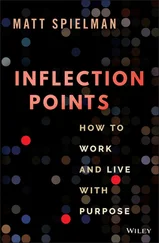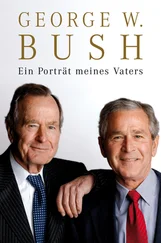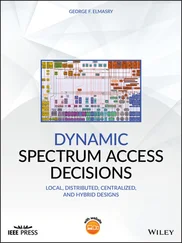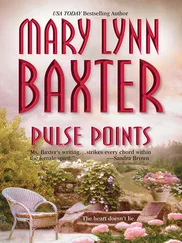
I had been trying to reach Laura all morning. She had been scheduled to testify before a Senate committee in support of our education initiative around the same time the planes struck the World Trade Center towers. I placed several calls, but the line kept dropping. I couldn’t believe that the president of the United States couldn’t reach his wife in the Capitol Building. “What the hell is going on?” I snapped at Andy Card.

Venting my frustrations to Andy Card. White House/Eric Draper
I finally connected with Laura as Air Force One descended into Barksdale. Laura’s voice is always soothing, but it was especially comforting to hear that day. She told me she had been taken to a safe location by the Secret Service. I was very relieved when she told me she had spoken to Barbara and Jenna, both of whom were fine. Laura asked when I was coming back to Washington. I told her that everyone was urging me not to return, but that I would be there soon. I had no idea whether that was true, but I sure hoped so.
Landing at Barksdale felt like dropping onto a movie set. F-16s from my old unit at Ellington Air Force Base in Houston had escorted us in. The taxiway was lined with bombers. It made for a striking scene, the power of our mighty Air Force on display. I knew it was only a matter of time before I put that power to use against whoever had ordered this attack.
There was no presidential motorcade assembled at Barksdale, so the commanding officer, General Tom Keck, had to improvise. The agents hustled me down the stairs of the plane and into a vehicle, which blasted off down the runway at what felt like eighty miles an hour. When the man behind the wheel started taking turns at that speed, I yelled, “Slow down, son, there are no terrorists on this base!” It was probably the closest I came to death that day.
I connected with Don Rumsfeld on a secure phone in General Keck’s office at Barksdale. Don had been hard to track down because he had become a first responder at the Pentagon. After the plane hit, he ran outside and helped emergency workers lift victims onto stretchers.
I told Don that I considered the attacks an act of war and approved his decision to raise the military readiness level to DefCon Three for the first time since the Arab-Israeli War of 1973. American military installations around the world heightened security precautions and prepared to respond immediately to further orders. I told Don our first priority was to make it through the immediate crisis. After that, I planned to mount a serious military response. “The ball will be in your court and [Joint Chiefs Chairman] Dick Myers’s court to respond,” I told him.
By 11:30 Louisiana time, it had been almost three hours since I had spoken to the country. I was worried people would get the impression that the government was disengaged. Laura had expressed the same concern. I taped a brief message explaining that the government was responding and that the nation would meet the test. The sentiment was right, but the setting—a sterile conference room at a military base in Louisiana—did not inspire much confidence. The American people needed to see their president in Washington.
I pressed Andy on when we could head back to the White House. The Secret Service agents felt it was still too uncertain. Dick and Condi agreed. They recommended that I go to the Strategic Command at Offutt Air Force Base in Nebraska. It had secure housing space and reliable communications. I resigned myself to delaying my return once again. As we boarded the plane at Barksdale, the Air Force loaded pallets of extra food and water into the belly. We had to be ready for any possibility.

After we arrived at Offutt, I was taken to the command center, which was filled with military officers who had been taking part in a planned exercise. Suddenly, a voice crackled over the sound system. “Mr. President, a nonresponsive plane is coming in from Madrid. Do we have authority to shoot it down?”
My first reaction was When is this going to end? Then I outlined the rules of engagement I had approved earlier. My mind ran through the worst-case scenarios. What were the diplomatic ramifications of shooting down a foreign plane? Or what if we were too late and the terrorists had already hit their target?
The voice on the loudspeaker returned. “The flight from Madrid,” he intoned, “has landed in Lisbon, Portugal.”
Thank God , I thought. It was another example of the fog of war.
We moved to the communications center, where I had called a national security meeting by videoconference. I had thought carefully about what I wanted to say. I started with a clear declaration. “We are at war against terror. From this day forward, this is the new priority of our administration.” I received an update on the emergency response. Then I turned to George Tenet. “Who did this?” I asked.
George answered with two words: al Qaeda.

Before 9/11, most Americans had never heard of al Qaeda. I had received my first briefing on the terrorist network as a presidential candidate. Arabic for “the base,” al Qaeda was a fundamentalist Islamic terror network hosted and supported by the Taliban government in Afghanistan. Its leader was Osama bin Laden, a radical Saudi from a wealthy family who had been expelled from the kingdom when he opposed the government’s decision to allow American troops to be there during the Gulf War. The group held extremist views and considered it their duty to kill anyone who stood in their way.
Al Qaeda had a penchant for high-profile attacks. Three years earlier, the terrorists had carried out simultaneous bombings of two American embassies in East Africa that killed more than two hundred and wounded more than five thousand. They were also behind the attack on the USS Cole that claimed the lives of seventeen American sailors off the coast of Yemen in October 2000. By the afternoon of 9/11, the intelligence community had discovered known al Qaeda operatives on the passenger manifests of the hijacked planes.
The CIA had been worried about al Qaeda before 9/11, but their intelligence pointed to an attack overseas. During the late spring and early summer of 2001, we had hardened security at embassies abroad, increased cooperation with foreign intelligence services, and issued warnings through the FAA about possible hijackings on international flights. In the first nine months of my presidency, we had helped disrupt terrorist threats to Paris, Rome, Turkey, Israel, Saudi Arabia, Yemen, and other places.
During the summer, I had asked the CIA to reexamine al Qaeda’s capabilities to attack inside the United States. In early August, the Agency delivered a Presidential Daily Briefing that reiterated bin Laden’s long-standing intent to strike America, but could not confirm any concrete plans. “We have not been able to corroborate some of the more sensational threat reporting, such as that … bin Laden wanted to hijack a U.S. aircraft,” the PDB read.*
On 9/11, it was obvious the intelligence community had missed something big. I was alarmed by the lapse, and I expected an explanation. But I did not think it was appropriate to point fingers or fix blame in the middle of the crisis. My immediate concern was that there could be more al Qaeda operatives in the United States.
I looked into the video screen in the Offutt bunker and told George Tenet to get his ears up, a term for listening to all the intelligence and running down every lead.
Читать дальше













